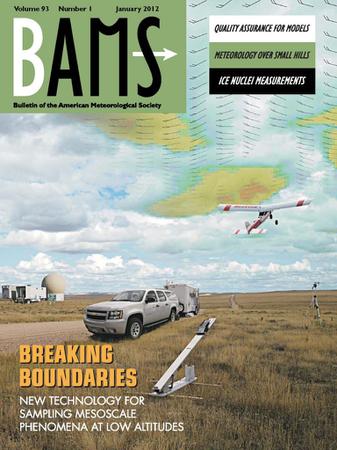Making Social Science Actionable for the NWS: The Brief Vulnerability Overview Tool (BVOT)
IF 5.9
1区 地球科学
Q1 METEOROLOGY & ATMOSPHERIC SCIENCES
引用次数: 0
Abstract
Abstract This paper provides an introduction to a new tool that is designed to provide operationally useful vulnerability information to National Weather Service (NWS) Weather Forecasting Offices (WFOs). The Brief Vulnerability Overview Tool (BVOT) is a shapefile containing local known, spatially specific, and weather hazard-related vulnerabilities in a format that is easily integrated into the existing forecasting, warning, and decision support responsibilities and tasks of NWS WFO meteorologists. The methods for gathering vulnerability data and then building a BVOT for a WFO leverages and strengthens the relationships that NWS WFOs already have with their local emergency managers (EMs) and core partners to work together to identify operationally useful, local vulnerability knowledge. The BVOT is populated with discrete, known vulnerabilities to provide NWS meteorologists spatial-situational awareness of those people, places, and things of greatest concern to their core partners. Crucially, the BVOT is a sub-sample of all potential vulnerabilities; its primary purpose is to make meteorologists aware of those weather hazard-specific vulnerabilities that, as we posed to them, “keep them awake at night.” Here we describe the development of the BVOT as a social science-informed operational tool; how the BVOT methods have evolved and how it can be integrated into the culture of the NWS as a tool for building and maintaining relationships with partners; and how the BVOT is designed to be used and its impact on operational decision making as observed in NOAA’s Hazardous Weather Testbed.让社会科学为国家气象局服务:简明脆弱性概述工具 (BVOT)
摘要 本文介绍了一种新工具,该工具旨在为国家气象局(NWS)天气预报办公室(WFOs)提供业务上有用的脆弱性信息。简要脆弱性概述工具(BVOT)是一种形状文件,包含当地已知的、特定空间的、与天气灾害相关的脆弱性,其格式易于集成到国家气象局天气预报办公室气象学家现有的预报、预警和决策支持职责和任务中。收集薄弱环节数据,然后为 WFO 建立 BVOT 的方法,充分利用并加强了 NWS WFO 与当地应急管理人员(EM)和核心合作伙伴之间已有的关系,共同确定对业务有用的当地薄弱环节知识。BVOT 包含离散、已知的脆弱性,为国家气象局气象学家提供对其核心合作伙伴最关注的人、地、物的空间环境感知。最重要的是,BVOT 是所有潜在脆弱性的子样本;其主要目的是让气象学家意识到那些特定于气象灾害的脆弱性,正如我们所说的,"让他们夜不能寐"。在此,我们将介绍 BVOT 作为一种以社会科学为基础的业务工具的发展情况;BVOT 方法是如何演变的,以及如何将其作为一种与合作伙伴建立和保持关系的工具融入到国家气象局的文化中;BVOT 是如何设计使用的,以及在 NOAA 的危险天气试验平台中观察到的其对业务决策的影响。
本文章由计算机程序翻译,如有差异,请以英文原文为准。
求助全文
约1分钟内获得全文
求助全文
来源期刊
CiteScore
9.80
自引率
6.20%
发文量
231
审稿时长
6-12 weeks
期刊介绍:
The Bulletin of the American Meteorological Society (BAMS) is the flagship magazine of AMS and publishes articles of interest and significance for the weather, water, and climate community as well as news, editorials, and reviews for AMS members.

 求助内容:
求助内容: 应助结果提醒方式:
应助结果提醒方式:


